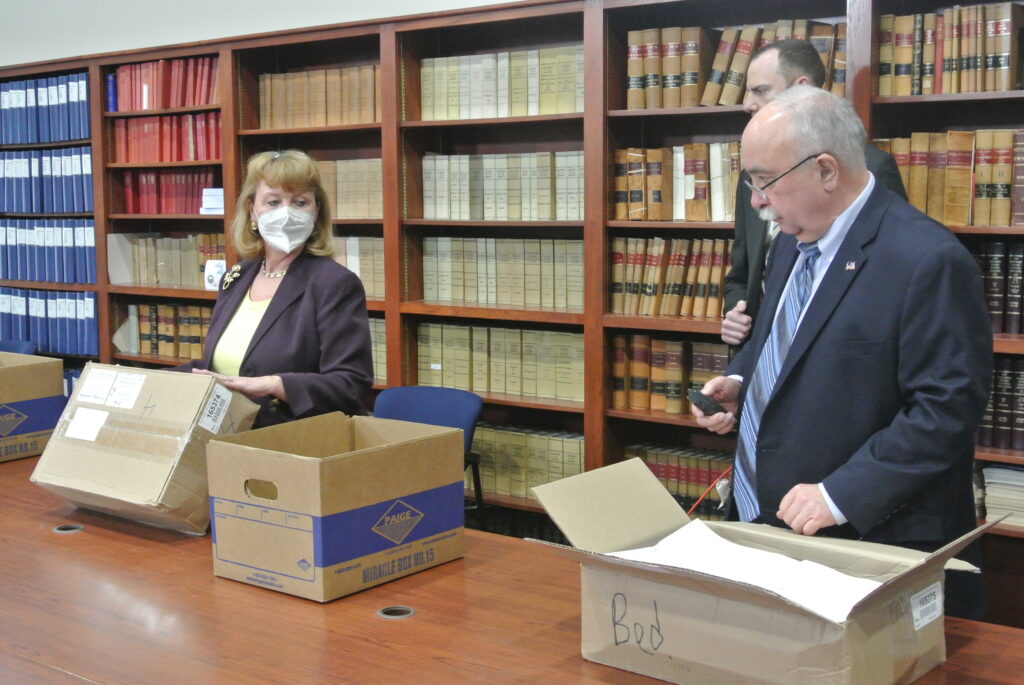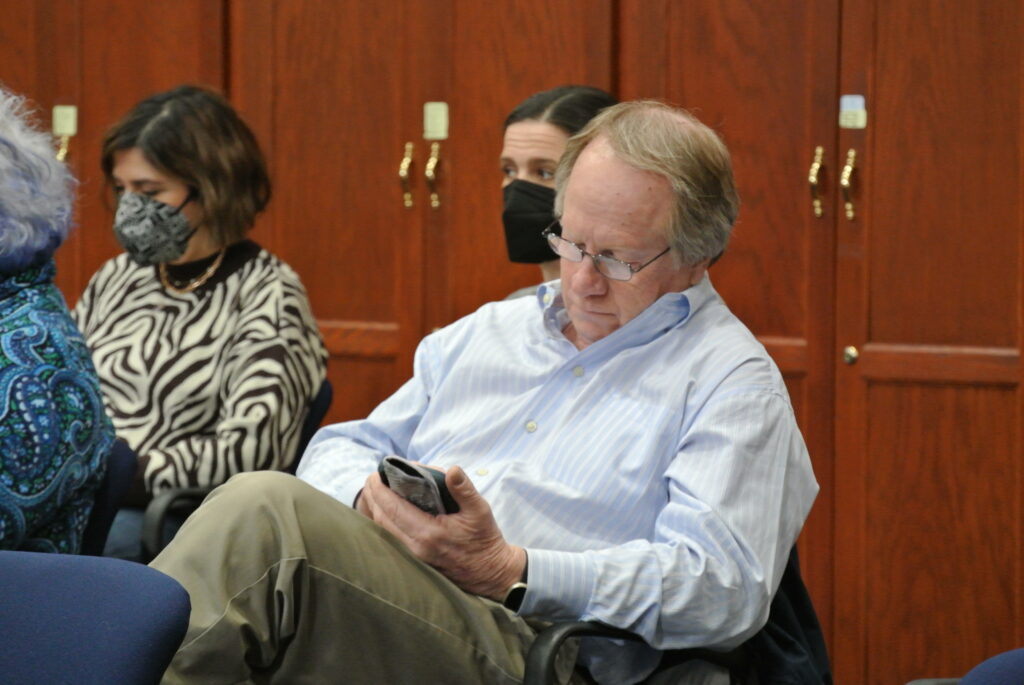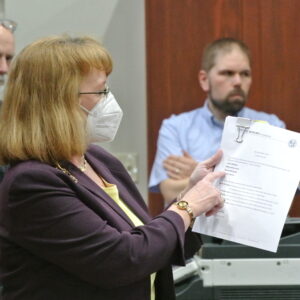CONCORD — Two more uncounted absentee ballots from Bedford’s 2020 presidential election were found Wednesday as officials with the New Hampshire Attorney General’s Office and the New Hampshire Secretary of State’s Office conducted a public count of all the town’s absentee ballots. It is the next step in their ongoing investigation into the mishandled ballots from the affluent community’s 2020 general election.
Associate Attorney General Anne Edwards led the effort to open about a dozen ballot boxes and check every one of the more than 7,000 absentee ballots cast in 2020.
“We reviewed all of the absentee envelopes that were involved in the Bedford general election – which was more than 7,000, almost 8,000 envelopes – to make sure that there were no other ballots that hadn’t been counted,” Edwards said.

Anne Edwards of the NH Attorney General’s office and Bud Fitch with the Secretary of State’s office review uncounted ballots from the 2020 general election in Bedford.
Bedford’s ballot boxes were seized by the Attorney General’s Office late last year after town officials were caught trying to hide a ballot snafu from the public. Close to 190 uncounted absentee ballots were found in the days after the November 2020 election. Town election officials tried to keep news of the uncounted ballots from leaking to the public despite Edwards and her staff advising that the impacted voters ought to be told.
The counting of all absentee ballots took place at the New Hampshire State Archives building in Concord in public view. The process took six hours as officials with the state went through all the absentee ballots and then checked through the known 188 uncounted ballots.
Edwards and her team also examined a second batch of ballots from the same election that were part of the original election count but lost for the subsequent recount. The ballots were reportedly discovered inside a box for a voting machine used in the September 2021 special election. Again, town officials tried to keep word of those ballots from spreading to Bedford voters. Edwards said the ballots should not have been laying around for close to a year.
“They should have been sealed at the end of the night and they should have been with the rest of the 2020 ballots, but they weren’t,” she said.
Edwards said a full report on what happened in Bedford is expected to be completed by the end of the month.
Former Bedford Town Moderator Bill Klein, who was part of the attempt to keep the public in the dark about the ballots, said the town struggled in 2020 dealing with an unprecedented number of absentee ballots cast during the COVID-impacted election. More than 16,000 Bedford voters cast ballots that year, with close to 8,000 absentee ballots.
“Hopefully we’ll never have to go through this again, but honestly maybe things should have been done a little bit differently,” Klein said Wednesday.
The fallout from the ballot errors already cost current Town Moderator Brian Shaughnessy a shot at becoming a circuit court judge. In 2020, Shaughnessy was the assistant town moderator and was the first person to tell Klein to keep quiet about the ballots.

Former Bedford Town Moderator Bill Klein is on hand as state officials review the ballots left uncounted during the 2020 general election.
After being brought before the Town Council, Shaughnessy said one reason he and Klein did not tell anyone in town government about the ballots was to prevent members of the public from finding out.
“If we came to the Town Council while the (Attorney General’s Office) investigation is pending it becomes public knowledge,” Shaughnessy has said.
Shaughnessy’s actions in the drama cost him support from the Executive Council when his judicial nomination was considered last month.
Klein later tried to blame the lack of transparency on the Attorney General’s Office, but that version of events is disputed by Edwards. She took Klein to task in a letter she sent to Klein and other town officials last year.
“Our office never instructed you not to tell anyone of the incident involving the 190 uncounted absentee ballots,” Edwards wrote to Klein.
According to Edwards, Klein was told last summer that he needed to tell the voters whose ballots were not counted what had happened. Klein dragged his feet on the notifications, according to Edwards’s letter.
“Since early June, our Office has been in contact with Bedford election officials regarding possible remediation plans and investigative interviews,” Edwards wrote. “During those conversations, Bedford election officials raised concerns that they did not want to notify voters of the fact that their ballots were not counted. Our Office directed that such a notification was a requirement of any remediation plan.”
Klein was directed to make the notification in August and again in September, and finally he was told by Edwards that he would have to make the notifications after the September special election. Klein finally told voters in October 2021.
Wednesday’s ballot examination in Concord was aimed in part at making sure all the people who had their ballots uncounted were in fact notified by Klein. State officials checked the names on the ballots against the names on the list of people the town had notified. No discrepancies were found during Wednesday’s examination.



